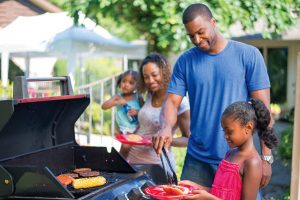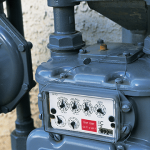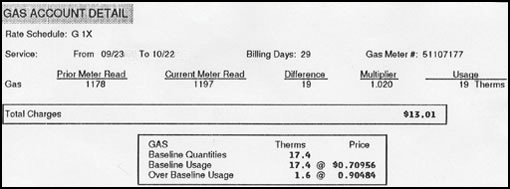How Gas Is Used
Natural gas accounts for about one-fourth of all energy used in the United States. Natural gas is used for heating buildings, heating water, cooking, drying clothes, lighting, and industrial purposes. Some household appliances that use natural gas include:

- Furnaces
- Pool and spa heaters
- Clothes dryers
- Outdoor lights
- Barbecues
- Water heaters
- Stoves/ranges
- Fireplace logs
- Patio heaters and fire pits
Do you have any of these appliances in your home? If so, do they run on natural gas? (For clues on how to recognize a natural gas appliance, take the Appliance Survey.)
Your Gas Bill
 The natural gas that comes to your home passes through a gas meter. Dials on the meter show how much natural gas your home has used. Some newer meters use digital displays instead of dials. Please, don’t tamper with a gas meter—it could be dangerous.
The natural gas that comes to your home passes through a gas meter. Dials on the meter show how much natural gas your home has used. Some newer meters use digital displays instead of dials. Please, don’t tamper with a gas meter—it could be dangerous.
The meter shows how much natural gas you use in a measurement called cubic feet (cf). One cf would fill a container that is one foot wide, one foot high, and one foot deep. One cf is the equivalent of just a little less than eight fluid gallons.
Your natural gas utility reads your meter regularly and uses the reading to calculate your gas bill. Every month or two the utility sends your household a gas bill, which tells you how much natural gas you used and how much you have to pay for it. The more gas you use, the higher your gas bill.

Be an Energy Saver
You can do a lot to save natural gas in your home. Natural gas is a nonrenewable resource, which means we can’t make more of it once the earth’s supplies are gone. Here are some ways to make sure your household uses gas wisely.
Heating:
- Set your heating thermostat to the lowest temperature that still keeps your home comfy—some recommend 68° F by day and 55° F by night.
- Close all window coverings at night to retain indoor heat.
- Close doors quickly when you enter or leave a house where heat is on.
- Ask an adult to make sure the fireplace damper is closed when the heating system is on so heated air doesn’t escape up the chimney.
- Remind adults to have heating systems cleaned annually and to replace furnace filters regularly.
Appliances:
- Use a clothesline when possible.
- Wait until the dishwasher is full before running it.
- Wash and dry full loads of laundry.
- Clean out the dryer lint filter before each load to improve airflow and reduce fire risk.
Bathing:
- Take short showers or half-full baths.
- Water-saving showerheads help conserve even more.
- Tell an adult about any leaky faucets.
Cooking:
- Set the flame just high enough to cover the pot bottom. It saves energy and is safer than a higher flame.
- Cover pots when cooking.
- Don’t open the oven too often.


